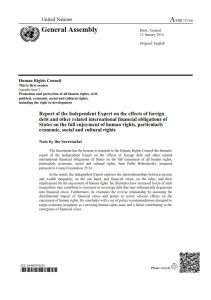Join getAbstract to access the summary!

Join getAbstract to access the summary!
United Nations Human Rights Council
Report of the Independent Expert on the Effects of Foreign Debt
...and Other Related International Financial Obligations of States on the Full Enjoyment of Human Rights, Particularly Economic, Social and Cultural Rights
United Nations, 2016
What's inside?
A United Nations report reveals inequality to be one of the causes of financial crises.
Recommendation
Policy leaders are increasingly focusing on income and wealth inequality as the global economy continues its plodding recovery from the 2008 financial crisis. Juan Pablo Bohoslavsky, the United Nations’ Independent Expert on foreign debt and human rights, examines whether inequality can cause financial disruptions and outlines the many effects that crises have on individuals’ “full enjoyment of human rights.” getAbstract recommends his cogent, erudite analysis, which explores the layered dimensions of the inequality debate, to policy makers, executives and investors.
Summary
About the Author
Juan Pablo Bohoslavsky, an attorney, is the United Nations’ Independent Expert on foreign debt and human rights.
















Comment on this summary